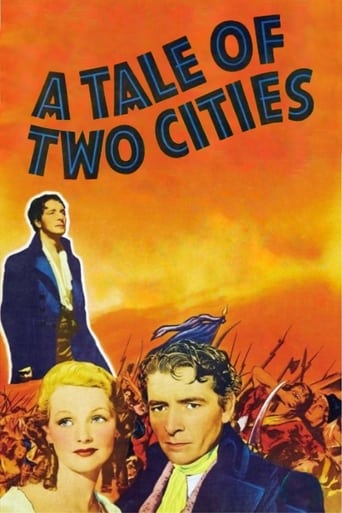Hitchcoc
In my opinion, the early movie versions of the Dickens novels stand out against the countless others. For one thing, they are produced in black and white, and seem to capture more of the authentic angst and fear that existed at that time. Many films today give us a more sanitized version of these works. Don't get me wrong. There have been some nice pieces done, but the bleakness of Victorian England really shows through here. Of course, this is the classic plot, where a man, Darnay, whose life has been upended, tries to go on with life, knowing that the Revolution creates incredible danger to him. We then have Sydney Carton, who has led a life of profligacy and has been weak when push came to shove. He carries a torch for Lucy Manette, but it is unrequited and hopeless. There are greats scenes of the citizenry and the venom (a rightful venom) that they carry in them. The problem with revolution is that the innocent are often punished when they have no skin in the game. This is so, and the mob scenes are stunning, though incredibly frightening. Ultimately, this is about a man who for one powerful moment has the opportunity to turn a worthless life into something meaningful. My hesitation about an afterlife and rewards in heaven aren't those of the man of which I speak. It is interesting to compare the casting of this film with other versions. I think this will stand the test of time. Granted, all Dickens books are filled with subplots and characters not seen here, but that's what movie producers and writers must constantly face.
robert-gallegos33
I was first introduced to Charles Dickens' Tale of Two Cities in an 8th grade English class. When reading it was assigned I skimmed through the text without so much as a thought to the story. Later, when advised a test was to include questions on the story, I immersed myself into it and found myself enraptured with the story, the characters, the redemption and sacrifice of Sydney Carton for those he grew to love.Growing up in the 50's and early 60's, one was without knowing it at the time, gifted to watch multiple TV showings of now classic movies from the 30's, 40's and early 50's every afternoon.Maybe because I was discovering the opposite sex but I so identified, at fifteen, with Sydney Carton and his unrequited love for one he could not have, and his ultimate sacrifice for Lucie as a way of winning a place in her heart forever.I watched Sydney's apathy with life and his resignation to never fulfilling goals he had probably felt so close to his grasp at an earlier time. Ronald Coleman's performance was one I have felt since with each viewing.I have a niece that at 15, began providing her DVD's of the classics. The first was a Tale of Two Cities and even now, at 21 with a child of her own, she always jokingly tells me that she hates me for enlightening her with that movie as she has always felt that Sydney should not have switched places, no matter how noble the reason because she felt he and Lucie should have ended up together.Even though I always point out the improbability of that and of the deeper notions of true love and the nobility of the ultimate sacrifice when called for, she remains unchanged and I smile because I know the everlasting impression that the story will remain with her forever.I just gifted her with a beautifully printed, gold leafed edition of the book and instructed her to read it to her daughter when old enough, so she can also pass on a classic beautiful story by Charles Dickens and the Ronald Coleman film as well.Unfortunately, I never had children of my own but know I have passed on to this beautiful, intelligent young woman a gift of classic appreciation.
Martin Teller
I consider Dickens one of my favorite authors, but the truth is I've only read a few of his works. I haven't read "A Tale of Two Cities," but I was not surprised to find it a very compelling story, populated by memorable, likable characters, graced with intriguing drama, and commenting on the cruelty and injustice perpetuated by both sides of the French Revolution. Some characterizations and flourishes are a bit too much (the storming of the Bastille, although wonderfully constructed by Lewton and Tourneur, is marred by some over-the-top titles) but for the most part it's a rock solid film, easily watchable and quite enjoyable. Excellent production value and strong performances. It made me want to read the novel, which is perhaps the finest thing an adaptation can accomplish.
jdix-2
The story line may not seem to be your usual cup O' tea, but I was impressed. It's the way Dickens would probably have wanted it made for the screen, and TV. It is as if someone went back in time with a hidden camera to bring us what it might have been like had we too lived in that era, under the changing social mores and attitudes.You'll probably recognize some of the character actors, as well as how their lines are delivered - truly realistic, and professional. No talent goes unused - from street urchin to the aristocrat - all do a great job.You will enjoy A Tale of Two Cities because even without colour, the techniques and skills put behind the camera, direction and lighting, plus background music create what colour can never do - an artistic, enticing, and most entertaining movie.



